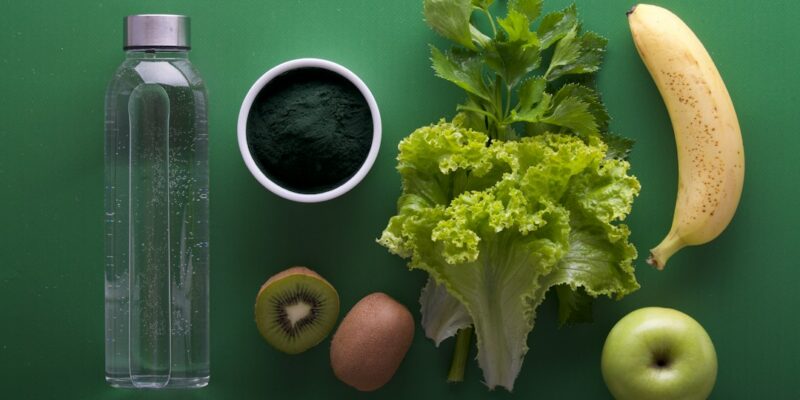
Quench Your Thirst for Health: 5 Healthy Hydration Habits to Adopt Now
Hydration is a crucial aspect of maintaining overall health and well-being. Our bodies are made up of about 60% water, and every system in our body relies on water to function properly. From digestion to circulation, hydration plays a vital role in keeping our bodies functioning optimally.
One of the key benefits of staying hydrated is improved digestion. Water helps to break down food and aids in the absorption of nutrients. It also helps to prevent constipation by keeping the digestive system moving smoothly. Additionally, staying hydrated can lead to clearer skin. When our bodies are properly hydrated, our skin is better able to flush out toxins and maintain a healthy glow.
Furthermore, hydration is essential for cognitive function. Studies have shown that even mild dehydration can impair brain function, leading to decreased focus, memory, and overall cognitive performance. By staying hydrated, we can ensure that our brains are functioning at their best.
Key Takeaways
- Hydration is important for overall health and well-being.
- Drinking more water is the foundation of healthy hydration habits.
- Adding flavor to water can make it more enjoyable to drink.
- Herbal tea and fruit-infused water are healthy and delicious alternatives to plain water.
- Coconut water is a great option for those with active lifestyles.
Drink More Water: The Foundation of Healthy Hydration Habits
The first step in maintaining healthy hydration habits is to drink more water. The recommended daily water intake varies depending on factors such as age, sex, weight, and activity level. However, a general guideline is to drink at least eight 8-ounce glasses of water per day, which equals about 2 liters or half a gallon.
To increase your water consumption, it can be helpful to carry a water bottle with you throughout the day. Having water readily available makes it easier to stay hydrated and serves as a reminder to drink more frequently. Setting reminders on your phone or computer can also be helpful in reminding you to drink water regularly.
Make Water Taste Better: Creative Ways to Flavor Your Water
While plain water is essential for hydration, some people find it boring or difficult to drink enough of it throughout the day. Fortunately, there are several creative ways to flavor your water and make it more enjoyable to drink.
One option is to infuse your water with fruits and herbs. This not only adds flavor but also provides additional health benefits. For example, adding slices of lemon or cucumber to your water can help to detoxify the body and improve digestion. Mint leaves can add a refreshing taste, while berries can provide antioxidants and vitamins.
If you prefer a sweeter taste, you can add natural sweeteners like honey or stevia to your water. These options are healthier alternatives to artificial sweeteners and can add a touch of sweetness without adding extra calories.
Another option is to use sparkling water for a refreshing twist. Sparkling water can be a great alternative to sugary sodas or juices, as it provides the same bubbly sensation without the added sugar or calories. You can also experiment with adding fruits or herbs to sparkling water for added flavor.
Hydrate with Herbal Tea: The Health Benefits of Herbal Infusions
| Health Benefit | Description |
|---|---|
| Hydration | Herbal tea is a great way to stay hydrated throughout the day, as it contains no calories or sugar. |
| Antioxidants | Herbal infusions are rich in antioxidants, which help to protect the body from damage caused by free radicals. |
| Reduced Inflammation | Certain herbs, such as ginger and turmeric, have anti-inflammatory properties that can help to reduce inflammation in the body. |
| Improved Digestion | Many herbs, such as peppermint and chamomile, have been shown to improve digestion and relieve digestive issues such as bloating and gas. |
| Reduced Stress | Herbal teas such as lavender and lemon balm have calming properties that can help to reduce stress and anxiety. |
In addition to water, herbal tea can be a great way to stay hydrated while enjoying additional health benefits. Herbal teas are made from a variety of plants and herbs, each with its own unique properties and health benefits.
For example, chamomile tea is known for its calming properties and can help to reduce stress and promote better sleep. Peppermint tea is known for its soothing effects on the digestive system and can help to relieve bloating and indigestion. Green tea is rich in antioxidants and can boost metabolism and aid in weight loss.
To brew the perfect cup of herbal tea, start by boiling water and pouring it over your tea bag or loose tea leaves. Let it steep for the recommended amount of time, usually around 5-10 minutes, depending on the type of tea. Then, strain the tea and enjoy it hot or cold.
Get Your Vitamins with Fruit-Infused Water: Delicious and Nutritious Beverages
Fruit-infused water is a delicious and nutritious way to stay hydrated while getting a boost of vitamins and antioxidants. By infusing water with fruits, you can add natural flavors and make your water more enjoyable to drink.
One of the benefits of fruit-infused water is that it provides added vitamins and antioxidants. Different fruits contain different vitamins and minerals, so by combining a variety of fruits, you can ensure that you are getting a wide range of nutrients.
There are endless possibilities when it comes to fruit combinations for infused water. Some popular options include strawberry and basil, lemon and mint, or cucumber and lime. You can experiment with different combinations to find your favorite flavors.
To make fruit-infused water, simply add sliced fruits or berries to a pitcher of water and let it sit in the refrigerator for a few hours or overnight. The longer you let it infuse, the stronger the flavor will be. You can also muddle the fruits before adding them to the water to release more flavor.
Sip on Smoothies: Hydrating and Nutritious Blends for Any Time of Day

Smoothies are not only delicious but also a great way to stay hydrated while getting a dose of essential nutrients. They are quick and easy to make, making them a perfect option for busy mornings or as a snack throughout the day.
One of the benefits of smoothies is that they are hydrating. Many smoothie recipes include ingredients like coconut water or cucumber, which have high water content and can help to replenish fluids in the body.
To make a hydrating smoothie, start with a liquid base such as coconut water, almond milk, or plain water. Then, add your choice of fruits, vegetables, and other ingredients like yogurt or protein powder. Blend everything together until smooth and enjoy!
To save time in the morning, you can also make smoothies ahead of time and store them in the refrigerator or freezer. Simply blend all the ingredients together and pour the smoothie into individual containers. In the morning, grab a smoothie from the fridge or freezer, and you’re ready to go.
Coconut Water: The Ultimate Hydrating Beverage for Active Lifestyles
Coconut water is often hailed as the ultimate hydrating beverage, especially for those with active lifestyles. It is a natural source of electrolytes, which are essential for maintaining proper hydration and fluid balance in the body.
One of the benefits of coconut water is its high potassium content. Potassium is an electrolyte that helps to regulate fluid balance, muscle contractions, and nerve function. By consuming coconut water, you can replenish your potassium levels and prevent muscle cramps and fatigue.
There are different types of coconut water available on the market. Fresh coconut water is extracted directly from young coconuts and is considered the most natural and nutritious option. Packaged coconut water is another option and is available in various brands and flavors. It is important to read the labels and choose a brand that does not contain added sugars or artificial ingredients.
Coconut water can be enjoyed on its own or used as a base for smoothies or other beverages. It can also be used as a post-workout drink to replenish electrolytes lost during exercise.
Avoid Dehydration: Signs and Symptoms to Watch Out For
Dehydration occurs when your body loses more fluids than it takes in. It can happen for various reasons, such as excessive sweating, vomiting, diarrhea, or simply not drinking enough fluids throughout the day. It is important to recognize the signs and symptoms of dehydration so that you can take action to prevent it.
Common signs of dehydration include increased thirst, dry mouth, dark-colored urine, fatigue, dizziness, and headache. In severe cases, dehydration can lead to confusion, rapid heartbeat, low blood pressure, and even fainting.
To prevent dehydration, it is important to stay hydrated throughout the day. This means drinking water regularly, especially during hot weather or physical activity. It is also important to listen to your body and drink when you are thirsty.
Hydration and Exercise: How to Stay Hydrated During Physical Activity
Hydration is particularly important during exercise, as our bodies lose fluids through sweat. Proper hydration can help to prevent muscle cramps, fatigue, and heat exhaustion during physical activity.
The recommended fluid intake before, during, and after exercise varies depending on factors such as the intensity and duration of the activity, as well as individual factors like body weight and sweat rate. As a general guideline, it is recommended to drink about 17-20 ounces of water 2-3 hours before exercise, 7-10 ounces every 10-20 minutes during exercise, and 16-24 ounces for every pound of body weight lost after exercise.
It is also important to consider the electrolytes lost during exercise, especially if you are engaging in intense or prolonged physical activity. Electrolytes like sodium and potassium help to regulate fluid balance and muscle function. You can replenish electrolytes by consuming sports drinks or by adding a pinch of salt to your water.
Different types of physical activity may require different hydration strategies. For example, endurance athletes may need to consume more fluids and electrolytes compared to those engaging in shorter, less intense activities. It is important to listen to your body and adjust your hydration plan accordingly.
Adopting Healthy Hydration Habits for a Healthier You
In conclusion, hydration plays a crucial role in maintaining overall health and well-being. By staying hydrated, we can improve digestion, achieve clearer skin, and enhance cognitive function. There are several ways to incorporate healthy hydration habits into our daily lives.
Drinking more water is the foundation of healthy hydration habits. Carrying a water bottle and setting reminders can help to increase water consumption. Making water taste better by infusing it with fruits and herbs or adding natural sweeteners can make it more enjoyable to drink.
Herbal tea, fruit-infused water, and smoothies are delicious and nutritious options for staying hydrated. Coconut water is a great choice for those with active lifestyles, as it provides electrolytes and replenishes fluids in the body. It is important to recognize the signs and symptoms of dehydration and take steps to prevent it, especially during exercise.
By adopting healthy hydration habits, we can prioritize our health and well-being. Staying hydrated is a simple yet powerful way to improve our overall quality of life. So grab a glass of water or your favorite hydrating beverage and cheers to a healthier and happier you!
FAQs
What is hydration?
Hydration is the process of providing adequate fluids to the body to maintain its normal functions.
Why is hydration important?
Hydration is important because it helps regulate body temperature, transport nutrients, and remove waste products from the body.
How much water should I drink per day?
The recommended daily water intake varies depending on age, gender, and activity level. However, a general guideline is to drink at least 8 cups (64 ounces) of water per day.
What are some signs of dehydration?
Signs of dehydration include thirst, dry mouth, dark urine, fatigue, dizziness, and headache.
What are some healthy hydration habits?
Some healthy hydration habits include drinking water throughout the day, carrying a water bottle with you, drinking water before, during, and after exercise, and consuming water-rich foods such as fruits and vegetables.
Can I drink other beverages besides water to stay hydrated?
Yes, other beverages such as tea, coffee, milk, and juice can contribute to your daily fluid intake. However, it is important to limit sugary and caffeinated beverages as they can have negative effects on hydration.
Can I overhydrate?
Yes, overhydration can occur when the body takes in more fluids than it can eliminate. This can lead to a condition called hyponatremia, which is characterized by low sodium levels in the blood. It is important to drink fluids in moderation and listen to your body’s thirst cues.


















